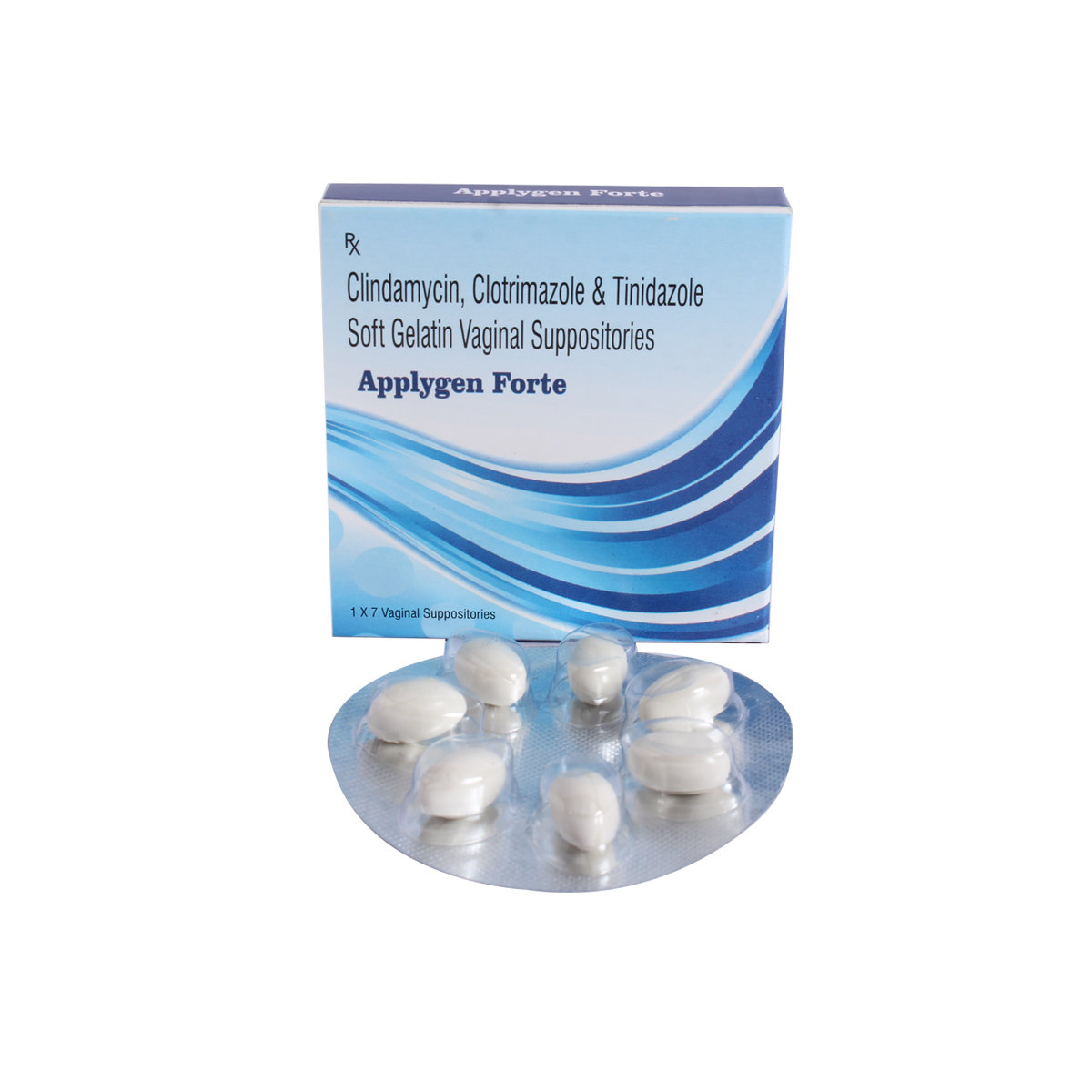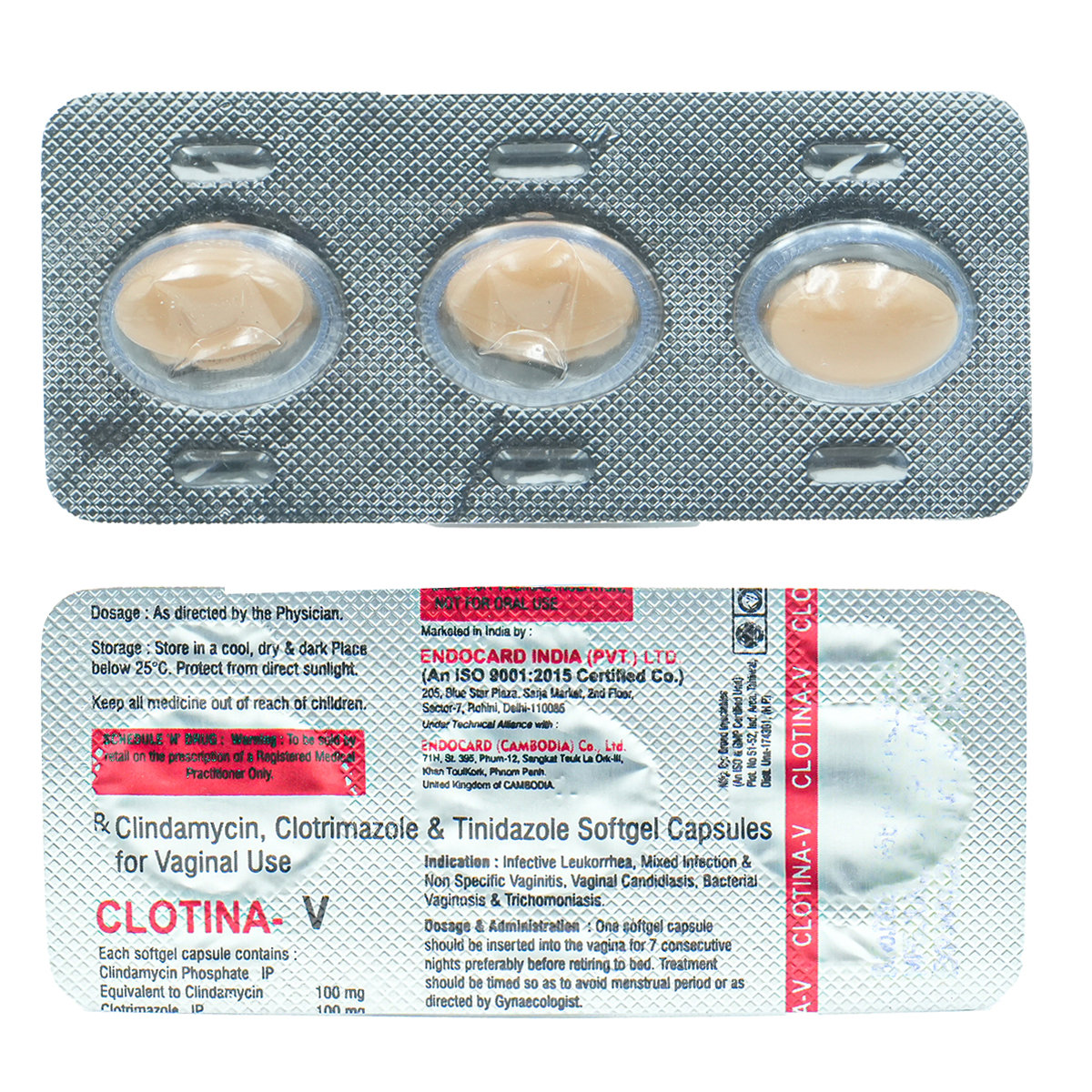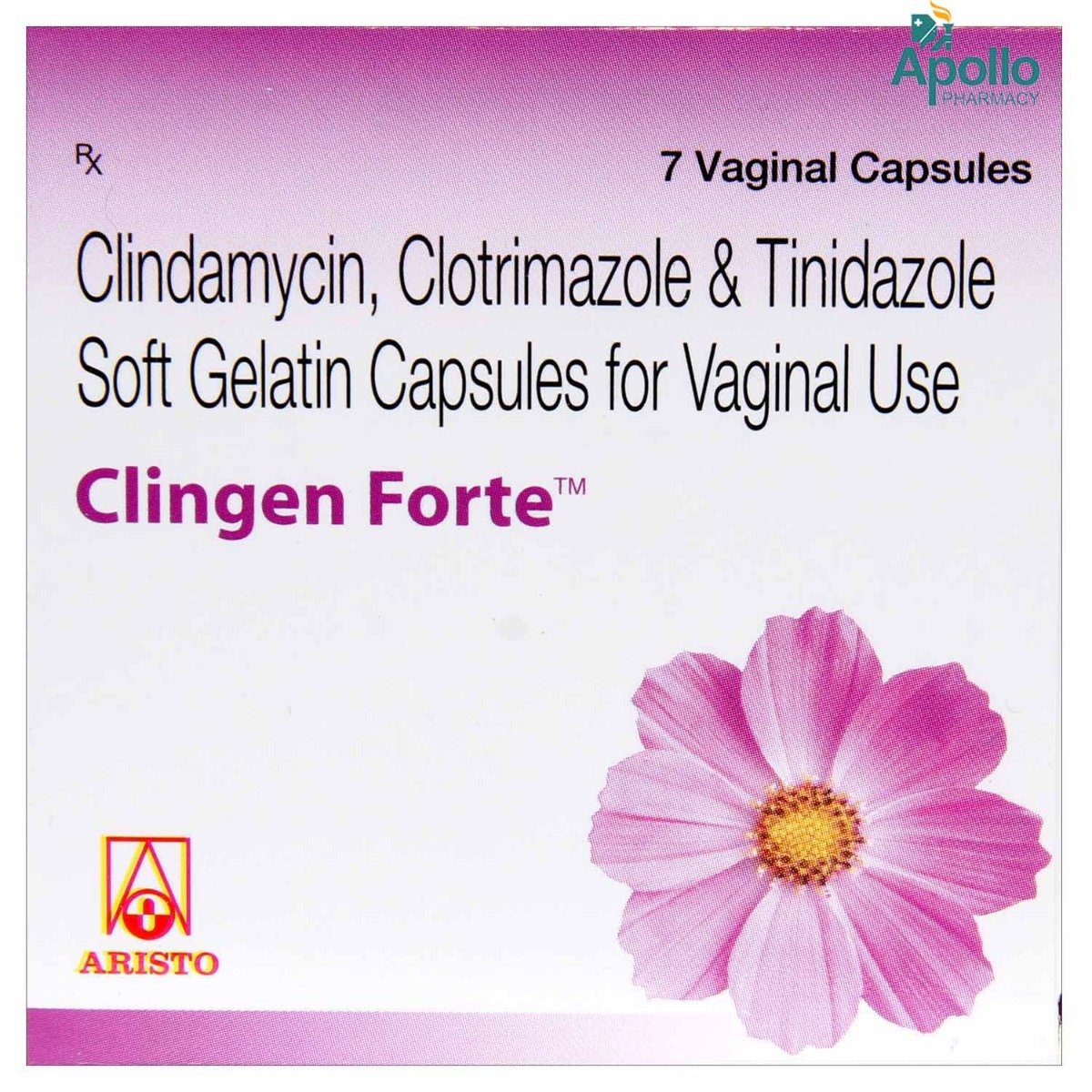Clindamycin+clotrimazole+tinidazole
About Clindamycin+clotrimazole+tinidazole
Clindamycin+clotrimazole+tinidazole belongs to the class of medications called 'vaginal antifungals' primarily used to treat vaginal infections caused by bacteria (bacterial vaginosis), yeast infection (candidiasis), and parasitic infections (trichomoniasis). Bacterial vaginosis is caused by the change in the average balance of vaginal bacteria. Vaginal yeast infection or Candidiasis is the infection of the vagina and tissues at the opening of the vagina (vulva). Trichomoniasis is a sexually transmitted infection caused by a parasite. Symptoms of a vaginal infection include itching, odour, and abnormal heavy white discharge from the vagina.
Clindamycin+clotrimazole+tinidazole comprises three medicines: 'Clindamycin' (antibiotic), 'Clotrimazole' (antifungal), and 'Tinidazole'. Clindamycin belongs to the lincomycin antibiotic group that inhibits bacterial protein synthesis, which is required for the bacteria's survival. Tinidazole is an antibiotic or antiprotozoal which kills amoeba and parasites. On the other hand, Clotrimazole belongs to the imidazole antifungal group that kills fungi by causing holes in their cell membrane, thereby leaking all content.
Common side effects of Clindamycin+clotrimazole+tinidazole include burning sensation, irritation, and itching in the vaginal area. However, these side effects are mild and temporary in nature and sometimes go off after applying to the affected area.
Inform your doctor if you are allergic to any antibacterial, antifungal, clotrimazole, clindamycin, or any of its components. It is essential to tell your doctor if you use any other azole antifungal or lincomycin antibiotics agents before using Clindamycin+clotrimazole+tinidazole; otherwise, using other antifungal or antibacterial may lead to overdose and toxicity. Let your doctor know if have any liver, kidney, and gastrointestinal diseases (diarrhoea and colitis, an inflammation of the colon), allergic conditions (asthma, hay fever, eczema), diabetes, and immune system problems (HIV-AIDS). Clotrimazole and mineral oil additives in Clindamycin+clotrimazole+tinidazole may weaken rubber products' activities of contraceptive devices, latex condoms, diaphragms, and cervical caps. Sometimes, antibiotic medications can cause antibiotic resistance. In such cases, your doctor may prescribe other antibiotics you are not resistant to.
Uses of Clindamycin+clotrimazole+tinidazole
Medicinal Benefits
Clindamycin+clotrimazole+tinidazole is used to treat vaginal infections like bacterial vaginosis (BV), candidiasis, and trichomoniasis. It comprises three medicines: 'Clindamycin' (antibiotic), 'Tinidazole' (antibiotic), and 'Clotrimazole' (antifungal). Clindamycin is an antibiotic drug and works by inhibiting bacterial protein synthesis, which inhibits bacterial growth. It shows a bacteriostatic effect, which stops bacterial reproduction. Clotrimazole is an imidazole antifungal medication that prevents fungal growth by causing damage and leakage to the fungal cell membrane. Together Clindamycin+clotrimazole+tinidazole treats vaginal infections caused by bacteria, yeast, and parasites preventing white discharge, itchiness, and inflammation in the genitourinary area.
Directions for Use
Storage
Side Effects of Clindamycin+clotrimazole+tinidazole
- Burning sensation
- Irritation
- Itching in the vaginal area
Drug Warnings
Please inform your doctor if you use any prescription, non-prescription medicines, including vitamin and herbal supplements before using Clindamycin+clotrimazole+tinidazole. Do not use Clindamycin+clotrimazole+tinidazole if you are allergic to Clindamycin+clotrimazole+tinidazole or any of its components. Let your doctor know if have any liver, kidney and gastrointestinal diseases (diarrhoea and colitis, an inflammation of the colon), allergic conditions (asthma, hay fever, eczema), diabetes, and immune system problems (HIV-AIDS). It is advised to use Clindamycin+clotrimazole+tinidazole under your doctor's supervision if you use other azole antifungal medicines. Clotrimazole and mineral oil additive in Clindamycin+clotrimazole+tinidazole may weaken rubber product's activity (such as latex condoms, diaphragms, cervical caps).
Drug Interactions
Drug-Drug Interaction: Clindamycin+clotrimazole+tinidazole may interact with anaesthetic agents/skeletal muscle relaxants (atracurium, cisatracurium, doxacurium, mivacurium, pancuronium, pipecuronium, rapacuronium, rocuronium, vecuronium, succinylcholine, tubocurarine, and metocurine) and respiratory drugs (budesonide, formoterol).
Drug-Food Interaction: No interaction found/established.
Drug-Disease Interaction: Before taking Clindamycin+clotrimazole+tinidazole, let your doctor know if have any liver, kidney, and gastrointestinal diseases (diarrhoea and colitis, an inflammation of the colon), allergic conditions (asthma, hay fever, eczema), diabetes, and immune system problems (HIV-AIDS).
Drug-Drug Interactions Checker List:
Safety Advice

Alcohol
safe if prescribedNo interaction found/established.

Pregnancy
cautionThere are limited studies on how Clindamycin+clotrimazole+tinidazole affects the unborn baby during pregnancy. It is advised to use Clindamycin+clotrimazole+tinidazole after consulting your doctor.

Breast Feeding
cautionThere is limited data on how Clindamycin+clotrimazole+tinidazole affects breastfeeding infants. However, systemic absorption of Clindamycin+clotrimazole+tinidazole is negligible after topical and vaginal administration. Consult your doctor for further advice.

Driving
safe if prescribedNo interaction found/established.

Liver
cautionLet your doctor know if you have any history of liver diseases before taking Clindamycin+clotrimazole+tinidazole.

Kidney
cautionLet your doctor know if you have any history of kidney diseases before taking Clindamycin+clotrimazole+tinidazole.

Children
unsafeClindamycin+clotrimazole+tinidazole is not recommended for children below 12 years of age. Do not give this medicine to your child without medical advice.
Habit Forming
Diet & Lifestyle Advise
- Avoid frequent douching to maintain the natural moisture in the vagina.
- Use mild soap while taking baths and prefer warm baths.
- Avoid harsh products on your skin.
- Manage stress, eat healthily, drink plenty of water, exercise regularly, and get plenty of sleep.
- Avoid or limit the intake of alcohol and caffeine.
Special Advise
- Ask your partner to use condoms during sexual intercourse, which will prevent the further spread of sexually transmitted infections like gonorrhea.
- Proper hygiene and regular cleaning/washing of the genitourinary area with anti-infective wash are advisable.
- If possible, you should wear cotton underwear and pantyhose with a cotton crotch, preventing vaginal inflammation and irritation.
- Do not take Clindamycin+clotrimazole+tinidazole during the first trimester of pregnancy.
- Do not breast-feed while you are taking Clindamycin+clotrimazole+tinidazole for at least 3 days after your last dose.
Patients Concern
Disease/Condition Glossary
Vaginal infections: It is also referred to as ‘Vaginitis’ that can cause infection or inflammation of the vagina or external part of the vagina known as the vulva. Vaginal infections are generally caused due to bacteria, yeast, and parasites. White thick heavy discharge, foul odour, intense itchiness around the genitourinary area are the main characteristics of vaginal infections.
Vaginal bacterial infections: It causes greyish-white or yellow discharge with a fish-like odour that can be observed after sexual intercourse.
Vaginal yeast infections: It usually produces intense itching with sometimes white viscous discharge.
Vaginal Trichomoniasis: It is a parasitic infection that produces intense vaginal itching with a foul odour. Vaginal discharge colour is usually greenish-yellow.
FAQs
Clindamycin+clotrimazole+tinidazole is used to treat vaginal infections, such as bacterial vaginosis (BV), candidiasis and trichomoniasis. It consists of 'Clindamycin' (antibiotic), 'Tinidazole (antibiotic) and 'Clotrimazole' (antifungal). Clindamycin is an antibiotic drug and works by inhibiting bacterial protein synthesis, which inhibits bacterial growth. Tinidazole is an antibiotic or antiprotozoal which kills amoeba and parasites. Clotrimazole is an antifungal medication and stops fungi's growth by causing damage and leakage to the fungal cell membrane.
Clindamycin+clotrimazole+tinidazole should be used with proper caution and doctor consultation if you have any liver, kidney and gastrointestinal diseases (diarrhoea and colitis, an inflammation of the colon), allergic conditions (asthma, hay fever, eczema), diabetes and immune system problems (HIV-AIDS).
Do not stop using Clindamycin+clotrimazole+tinidazole even if you feel better until the doctor's advised course is finished. Your symptoms may improve before the infection is completely cured.
There are limited studies on how Clindamycin+clotrimazole+tinidazole affects the unborn baby during pregnancy. It is advised to use Clindamycin+clotrimazole+tinidazole after consulting your doctor. Do not take Clindamycin+clotrimazole+tinidazole during the first trimester of pregnancy.
There is limited data on how Clindamycin+clotrimazole+tinidazole affects breastfeeding infants. However, systemic absorption of Clindamycin+clotrimazole+tinidazole is negligible after topical and vaginal administration.
Keep Clindamycin+clotrimazole+tinidazole away from direct sunlight. Dispose of unused medicine and keep it out of sight and reach from children and pets.
Bacterial infections, yeast infections, parasitic infections, vaginal atrophy after menopause and irritants like body wash/soap/perfumes/vaginal contraceptives devices are some of the common causes of vaginal infections.
Your doctor might ask you a few questions about your sexual health like your history of past vaginal infections or if you have had any sexually transmitted infections (STIs) like gonorrhea. Besides this, your doctor might also perform a pelvic exam by collecting a vaginal discharge sample.







